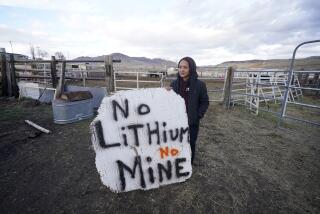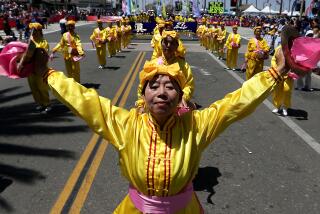Judge Rejects Suit Accusing Unocal of Conspiring With Myanmar
In a major setback for activists fighting the military regime in Myanmar, a federal judge in Los Angeles has dismissed a lawsuit accusing Unocal Corp. of promoting forced labor and other human rights abuses through its $1.3-billion pipeline project in the Southeast Asian country.
U.S. District Judge Ronald Lew ruled that, although the evidence suggests Unocal knew that forced labor was being used by government forces protecting the pipeline project, the plaintiffs failed to prove that the oil company had conspired with the Myanmar government or “controlled” the military’s actions.
Unocal said the ruling, handed down last week, validated the company’s claim that its “behavior and conduct has always been above reproach.” The plaintiffs were also ordered to pay Unocal’s court costs.
“Obviously, we’re very pleased with the court’s ruling,” said Barry Lane, a company spokesman. “The court has now ruled that there is no evidence showing any Unocal participation in human rights abuses in Myanmar.”
The plaintiffs, who include 15 Myanmar villagers, said they will appeal to the U.S. 9th Circuit Court of Appeals in San Francisco and predicted they will eventually prevail because of the judge’s conclusion that Unocal probably knew about abuses being committed by its host government.
Unocal is the largest remaining U.S. investor in Myanmar, an energy-rich nation in Southeast Asia formerly known as Burma. Its partners in the pipeline project include the French energy giant Total and Myanmar’s state-owned energy company.
In 1990, Myanmar’s military leaders seized power after the leading opposition party, led by Nobel laureate Aung San Suu Kyi, won a free election. Since then, the government has been accused of widespread abuses, including forced labor, abuse of women, and torture and imprisonment of political opponents. The U.S. government has led the campaign to sanction Myanmar and has banned new investment in that country.
In his 41-page order, Judge Lew said the plaintiffs--Myanmar’s government in exile, a trade union and a group of villagers from the pipeline region--had provided “ample evidence” linking the Myanmar government’s use of forced labor to human rights abuses. The case involved two separate lawsuits filed against Unocal on similar charges.
The judge also dismissed Unocal’s claim that a 1916 U.S. Supreme Court decision supporting the state of Georgia’s use of residents to build roads as a “public service” was analogous to Myanmar’s rulers forcing men, women and children to serve as military porters and road builders.
“The use of forced labor by the states of the United States during the early years of the 20th century is hardly analogous to the nature of the forced labor utilized by SLORC [Myanmar’s government] in recent years,” the judge wrote.
He also said Unocal’s discussions of the Myanmar project and the company’s transfer of funds to build the project was not sufficient to pursue a federal racketeering charge.
“The evidence does suggest that Unocal knew forced labor was being utilized and that the joint venturers benefited from the practice,” he wrote. He added that such a showing was “insufficient to establish liability” under international law.
In addition to an appeal, Dan Stormer, a Pasadena attorney representing the plaintiffs, said he plans to pursue a separate lawsuit in state court now that the federal lawsuit has been dismissed.
“We will take our case into state court and win,” he said. “Clearly, under well-established state law, it is an unfair business practice to rely upon murder, rape and terrorism as a function of your business.”
The ruling marked a second major legal victory for Unocal on the Myanmar front. Earlier this year, the U.S. Supreme Court struck down a Massachusetts state law that effectively boycotted firms that did business in Myanmar.
But Robert Benson, a Loyola University law professor, predicted activists will continue their legal battles against U.S.-based multinationals accused of doing harm abroad. He pointed to a case filed a year ago in federal court in San Francisco involving a Chevron pipeline project in Nigeria.
“Both of these [Myanmar] decisions were technically narrow so these do not sink the entire activists’ movement,” he said. “There are other cases.”
More to Read
Inside the business of entertainment
The Wide Shot brings you news, analysis and insights on everything from streaming wars to production — and what it all means for the future.
You may occasionally receive promotional content from the Los Angeles Times.










